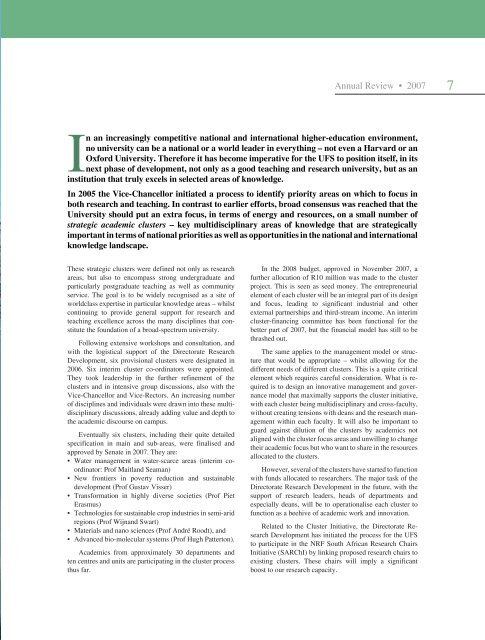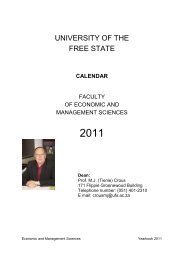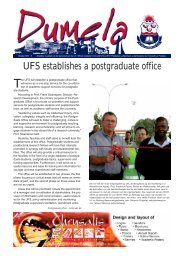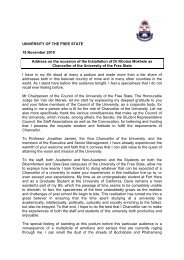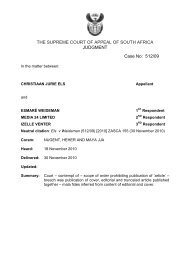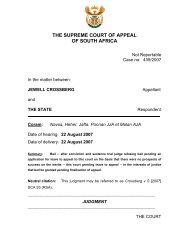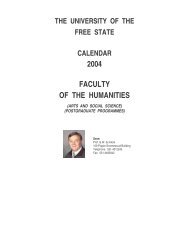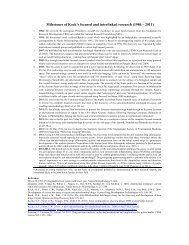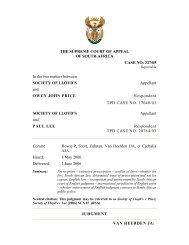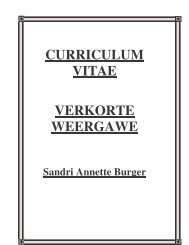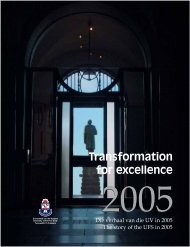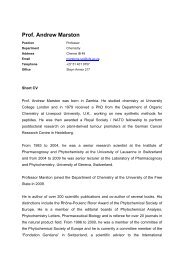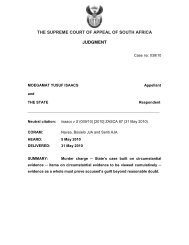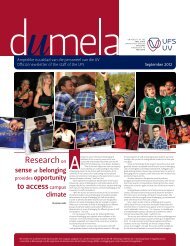UV Jaaroorsig - University of the Free State
UV Jaaroorsig - University of the Free State
UV Jaaroorsig - University of the Free State
Create successful ePaper yourself
Turn your PDF publications into a flip-book with our unique Google optimized e-Paper software.
These strategic clusters were defined not only as re search<br />
areas, but also to encompass strong undergraduate and<br />
particularly postgraduate teaching as well as com mu nity<br />
service. The goal is to be widely recognised as a site <strong>of</strong><br />
worldclass expertise in particular knowledge areas – whilst<br />
continuing to provide general support for research and<br />
teaching excellence across <strong>the</strong> many disciplines that constitute<br />
<strong>the</strong> foundation <strong>of</strong> a broad-spectrum university.<br />
Following extensive workshops and consultation, and<br />
with <strong>the</strong> logistical support <strong>of</strong> <strong>the</strong> Directorate Research<br />
Development, six provisional clusters were designated in<br />
2006. Six interim cluster co-ordinators were appointed.<br />
They took leadership in <strong>the</strong> fur<strong>the</strong>r refinement <strong>of</strong> <strong>the</strong><br />
clusters and in intensive group discussions, also with <strong>the</strong><br />
Vice-Chancellor and Vice-Rectors. An increasing number<br />
<strong>of</strong> disciplines and individuals were drawn into <strong>the</strong>se multidisciplinary<br />
discussions, already adding value and depth to<br />
<strong>the</strong> academic discourse on campus.<br />
Eventually six clusters, including <strong>the</strong>ir quite detailed<br />
specification in main and sub-areas, were finalised and<br />
approved by Senate in 2007. They are:<br />
• Water management in water-scarce areas (interim coordinator:<br />
Pr<strong>of</strong> Maitland Seaman)<br />
• New frontiers in poverty reduction and sustainable<br />
development (Pr<strong>of</strong> Gustav Visser)<br />
• Transformation in highly diverse societies (Pr<strong>of</strong> Piet<br />
Erasmus)<br />
• Technologies for sustainable crop industries in semi-arid<br />
regions (Pr<strong>of</strong> Wijnand Swart)<br />
• Materials and nano sciences (Pr<strong>of</strong> André Roodt), and<br />
• Advanced bio-molecular systems (Pr<strong>of</strong> Hugh Patterton).<br />
Academics from approximately 30 departments and<br />
ten centres and units are participating in <strong>the</strong> cluster process<br />
thus far.<br />
Annual Review • 2007 7<br />
In an increasingly competitive national and international higher-education environment,<br />
no university can be a national or a world leader in everything – not even a Harvard or an<br />
Oxford <strong>University</strong>. Therefore it has become imperative for <strong>the</strong> UFS to position itself, in its<br />
next phase <strong>of</strong> development, not only as a good teaching and research university, but as an<br />
institution that truly excels in selected areas <strong>of</strong> knowledge.<br />
In 2005 <strong>the</strong> Vice-Chancellor initiated a process to identify priority areas on which to focus in<br />
both research and teaching. In contrast to earlier efforts, broad consensus was reached that <strong>the</strong><br />
<strong>University</strong> should put an extra focus, in terms <strong>of</strong> energy and resources, on a small number <strong>of</strong><br />
strategic academic clusters – key multidisciplinary areas <strong>of</strong> knowledge that are strategically<br />
important in terms <strong>of</strong> national priorities as well as opportunities in <strong>the</strong> national and international<br />
knowledge landscape.<br />
In <strong>the</strong> 2008 budget, approved in November 2007, a<br />
fur<strong>the</strong>r allocation <strong>of</strong> R10 million was made to <strong>the</strong> cluster<br />
project. This is seen as seed money. The entrepre neu rial<br />
element <strong>of</strong> each cluster will be an integral part <strong>of</strong> its design<br />
and focus, leading to significant industrial and o<strong>the</strong>r<br />
external partnerships and third-stream income. An interim<br />
cluster-financing committee has been functional for <strong>the</strong><br />
better part <strong>of</strong> 2007, but <strong>the</strong> financial model has still to be<br />
thrashed out.<br />
The same applies to <strong>the</strong> management model or structure<br />
that would be appropriate – whilst allowing for <strong>the</strong><br />
dif ferent needs <strong>of</strong> different clusters. This is a quite critical<br />
element which requires careful consideration. What is required<br />
is to design an innovative management and governance<br />
model that maximally supports <strong>the</strong> cluster initiative,<br />
with each cluster being multidisciplinary and cross-faculty,<br />
with out creating tensions with deans and <strong>the</strong> research manage<br />
ment within each faculty. It will also be important to<br />
guard against dilution <strong>of</strong> <strong>the</strong> clusters by academics not<br />
aligned with <strong>the</strong> cluster focus areas and unwilling to change<br />
<strong>the</strong>ir academic focus but who want to share in <strong>the</strong> resources<br />
allocated to <strong>the</strong> clusters.<br />
However, several <strong>of</strong> <strong>the</strong> clusters have started to function<br />
with funds allocated to researchers. The major task <strong>of</strong> <strong>the</strong><br />
Directorate Research Development in <strong>the</strong> future, with <strong>the</strong><br />
support <strong>of</strong> research leaders, heads <strong>of</strong> departments and<br />
especial ly deans, will be to operationalise each cluster to<br />
function as a beehive <strong>of</strong> academic work and innovation.<br />
Related to <strong>the</strong> Cluster Initiative, <strong>the</strong> Directorate Research<br />
Development has initiated <strong>the</strong> process for <strong>the</strong> UFS<br />
to participate in <strong>the</strong> NRF South African Research Chairs<br />
Ini tia tive (SARChI) by linking proposed research chairs to<br />
existing clusters. These chairs will imply a sig nificant<br />
boost to our research capacity.


